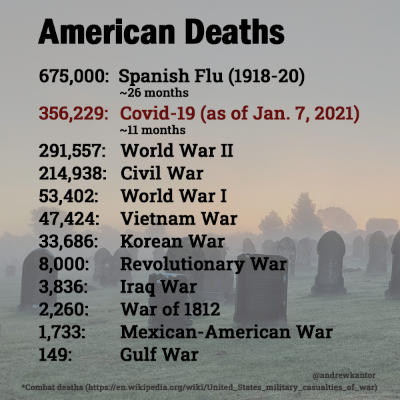Can’t smell this, when plasma works, what comes next, and more
08 Jan 2021
Posted by Andrew Kantor
Ramping up vaccinations
With the Covid-19 vaccine rollout still slow in many places, the federal government — although it’s not directly involved with the distribution — is doing what it can to help states get more people vaccinated.
- It’s decided on an “early launch” of its planned partnership with pharmacy chains — starting immediately, rather than having a gradual rollout.
- It’s urging states not to allow vaccines to sit unused. “[S]tates do not have to complete vaccination of all health care providers before moving on to other prioritized populations.”

Yet another metformin recall
Nostrum Labs is recalling its 750 mg metformin HCl extended release tablets: NDC 29033-056-01, lot number MET200501. That is all.
Smell ya later
Losing sense of smell post-Covid isn’t a rare thing, it seems. In fact, it affects a whopping 85.9 percent of people with mild cases (according to Belgian researchers).
The good news: 75 to 85 percent of them recover their senses after two months.
Goodbye, “institutional green”
Medications and therapies can to a lot to help with mental health, but for people who are in a facility, architecture matters. Getting rid of the feeling of a hospital (or worse) is crucial.
Nature plays a big role: Windows provide views of greenery, landscapes decorate walls, and outdoor areas give patients and staff access to fresh air and sunlight.
The new approach, promoted as healing and therapeutic, has produced environments that are more calming and supportive. And it feels particularly timely, given the surge in mental health issues created by the pandemic.
The early bird gets the plasma
First blood plasma transfusions from recovered patients were thought to be a great treatment for Covid-19. Then it seemed it didn’t help much. Now Argentinian researchers think they’ve found the sweet spot: Convalescent plasma works, but only if given early — “within days of the onset of the illness.”
Administering the therapy too late in the course of disease […] is akin to allowing a burglar to ransack a home for hours before deciding to call the police.
The human way
So you know that one treatment for osteoporosis is the hormone calcitonin. But the kind that’s given to people is salmon calcitonin, because the human version essentially breaks down in solution and isn’t very effective. Unfortunately, the salmon version isn’t very potent and can have some nasty side effects.
Enter Purdue researchers, who have found a way to make a stable, prodrug form of human calcitonin, which they say is more effective than the salmon variety with fewer side effects.
“Our approach will increase the therapeutic potential of human calcitonin, promising a more effective option to replace salmon calcitonin for osteoporosis and related disorders.”
Pollen and urinary pain
Pollen doesn’t just trigger allergies. Apparently, Washington University researchers found, high pollen counts can trigger flare-ups of urologic pain in people with Urological Chronic Pelvic Pain Syndrome.
Of note: The cause of UCPPS isn’t known, so this allergen connection might provide clues to the condition. (It’s already known that allergy and asthma medications relieve UCPPS symptoms.)
The Long Read: What-Could-Happen edition
What might Joe Biden and the Democrats do for healthcare? Short version: Try to expand access and coverage, and reduce prices. Long version: a bit more complicated.


